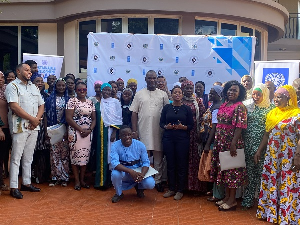The National Coordinating Office (NCO) of the African Continental Free Trade Area (AfCFTA) has urged small-scale enterprises to begin exploring the trade opportunities AfCFTA offers to be able to start exporting their products to other parts of Africa.
The NCO said the AfCFTA agreement, ratified by 47 African countries, removes almost every trade bottleneck hampering effective trading among indigenous African businesses, hence the need for Ghanaian businesses to begin to take full advantage of the opportunities it presents.
Speaking at a day’s training for women and youth-led Micro, Small, and Medium-scale Scale Enterprises (MSMEs) in the Northern Region, Divine Kuturtse, Programme Manager, Enterprise Development and Support and Trade Finance at the National Coordinating Office of the African Continental Free Trade Area, disclosed that the NCO was opening an office in Tamale to provide support services to businesses in Northern Ghana.
“The office is establishing an AfCFTA desk in Tamale so that businesses in the northern part of Ghana can easily access this information. We encourage them to take advantage of the AfCFTA. Others are coming into our country, so we want them to also go into the African market with AfCFTA,” he said.
He added that the NCO would also establish desks at the Food and Drugs Authority and the Ghana Standards Authority, which will sensitize the staff of the two institutions on AfCFTA and the need to fast-track the certification processes of MSMEs.
Mr. Kuturtse said this was in response to complaints by the MSMES that their products are usually delayed for several months or years before being certified by the two certification institutions.
He noted that, for international agreements to be successfully adopted and implemented, there was a need for countries to first practice them domestically.
Mr. Kuturtse therefore emphasized the need for Ghanaian institutions to speed up the certification processes and make it easier for businesses to be able to succeed in the African market.
“International agreements need to first be practiced domestically. If we don’t survive domestically, we can’t survive in the international market. One of the things we are doing is that we’re also establishing AfCFTA desks in these institutions so that these people begin to sensitize them because if they are not sensitized about this AfCFTA, this is where we’ll be having these issues,” Mr. Kuturtse emphasized.
The African Continental Free Trade Area (AfCFTA) is a flagship project of the African Union (AU) under its Agenda 2063 development framework.
It aims to create a single continental market for goods and services, with free movement of businesspeople and investments.
It also seeks to accelerate intra-African trade, enhance competitiveness, and support African economic transformation.
Dr. Fareed Arthur, National Coordinator of the AfCFTA, said MSMEs are very important to the Ghanaian economy as they constitute about 80 percent of the country’s Gross Domestic Product (GDP).
He said it was on that basis that the NCO of AfCFTA is collaborating with the United Nations Development Programme (UNDP) to train women and youth who own businesses on the opportunities AfCFTA offers.
He said the office will be holding similar training for women and youth-led MSMEs across the country to ensure that Ghana derives the maximum opportunities available through the continental free trade area.
Dr. Fareed said they were also working with the MSMEs to produce more sophisticated products for export.
Jemima Michael, Programme Analyst (Inclusive Entrepreneurship) at UNDP, emphasized that the UNDP/NCO collaboration aims to provide integrated support to businesses, particularly women and youth-owned MSMEs, as a strategy to unlock the productivity of these MSMEs and create an enabling environment for them to expand their businesses beyond borders and contribute meaningfully to the economic growth and development of Ghana.
Business News of Thursday, 22 August 2024
Source: Mumuni Yunus, Contributor













